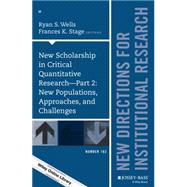from more traditional positivistic and postpositivistic approaches. While the first volume provided an expanded conceptualization of critical quantitative inquiry, this volume concludes the series by:
- applying critical quantitative approaches to new populations of college students who are rarely addressed in institutional and higher education research, such as American Indian, Alaska Native, and students with disabilities,
- applying the principles of quantitative criticalism to advanced methods of statistical analysis, and
- discussing the variety of challenges to overcome and presenting a future research agenda using these methods.
This is the 163rd volume of this Jossey-Bass quarterly report series. Timely and comprehensive, New Directions for Institutional Research provides planners and administrators in all types of academic institutions with guidelines in such areas as resource coordination, information analysis, program evaluation, and institutional management.








